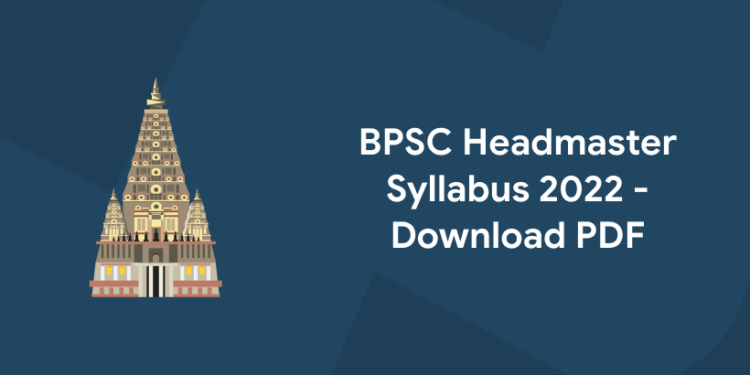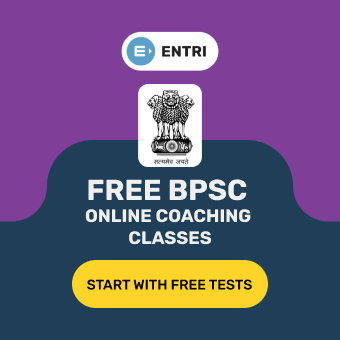Table of Contents
The Bihar Public Service Commission has issued a notification for 6421 Headmaster positions. You may download the BPSC Headmaster Syllabus 2022 Exam Pattern in Hindi/English PDF format from this link. The following is a full syllabus and test pattern for Bihar Head Master Recruitment 2022.To get all of the details, read the entire article.
The PDF of the Bihar PSC Headmaster Syllabus and Exam Pattern 2022 has been released. From the 5th to the 28th of March 2022, eligible individuals can apply online for BPSC Headmaster Recruitment 2022. For their preparations, candidates also required the exam pattern and syllabus.
Download Entri App and prepare for BPSC Exam
BPSC Headmaster Syllabus 2022: Overview
|
BPSC Headmaster Recruitment 2022 |
|
| Organization Name | Bihar Public Service Commission (BPSC) |
| Name of the Post | Headmaster |
| No.of Vacancies | 6421 |
| Job Location | Bihar |
| Selection Process | Written Exam |
| Category | Syllabus |
| Application Starting Date | 5th March 2022 |
| Application Last Date | 28th March 2022 |
| Official Website | bpsc.bih.nic.in |
Bihar Headmaster Exam Pattern 2022
- Type of Exam – Written Exam
- MCQ type of question (Multiple Choice Questions) Based
- The total number of questions is 150.
- The total number of marks is 150.
- 01 mark for each question
- 25 marks for negative marking
- Time allotted for the exam is 2 hours.
| Subject | No. of Questions | No. of Marks | Time Duration |
| General Studies | 100 | 100 | 2 Hours |
| B.Ed Related questions | 50 | 50 | |
| Total | 150 | 150 | 120 Minutes |
BPSC Headmaster Syllabus 2022
|
General Studies |
|
| The subject on General studies will include questions covering the following fields of
knowledge:- |
● General Science.
● Current events of national and international importance. ● History of India and salient features of the history of Bihar. ● Indian National movement and the part played by the Bihar in it’ ● Geography. ● Indian Polity. ● Indian EconomY. ● Elementary Mathematics and Mental ability test’ |
| Details of the above mentioned Subjects | ● Questions on General Science will cover general appreciation and understanding of science, including matters of everyday observation and
● experience, as may be expected of a educated person who has not made a special study of any scientific discipline. ● Questions on Current events of national and international importance consist of national and international events including Bihar. ● In History, emphasis will be on broad general under-standing of the subject in its social, economic and political aspects. The candidates are expected to be familiar with the broad aspects of the history of Bihar. Indian National Movement will relate to the nature and character of the nineteenth century resurgence, growth of nadonalism and attainment of Independence and candidates will be expected to answer questions on the role of Bihar in the freedom movement of India. ● General Geography and geographical division of Bihar and its major river systems. Questions on Geography of India and Bihar will relate to physical, social and economic Geography of the country including the main features of Indian agricultural and natural resources. ● Questions on Indian polity will test knowledge on the Indian Constitution, Country’s political system, Panchayati Raj and Various development Programmes. ● Questions on Indian Economy will test knowledge on Basic economy, Indian economy and economy of Bihar . ● Questions on Elementary Mathematics and Mental ability will test.
|
|
Bachelor of Education in the Universities of Bihar |
|
| UNIT.1 | ● Understanding Childhood : Developmental Perspective
● children and their childhood: The contextual Realities of Bihar ● Dimensions of individual development: physical, cognitive, language, social and moral ● their interrelationships and implications for teachers (with reference to Piaget Erickson and Kohlberg) ● Adolescence : assumptions, stereotypes and need of a holistic understanding ● Factors affecting adolescence: social, cultural, political and economic ● The contextual reality of adolescence in Bihar |
| UNIT.2 | ● Socialization and the context of school : impact of entry to 3chool,- school as a social
● Institution and its notions in Bihar, value formation in the context of schooling’ Inequalities and resistances in society: issues of access, retention and exclusion’ ● Difference in learners based on socio-cultural contexts : impact of home languages of ● learners and language of instruction, impact of differential cultural capital of learners understanding of differently-abled learners: slow learners and dyslexic learners ● Methods of assessing individual differences: tests, observation, rating scales’ self |
| UNIT.3 | ● Understanding’ Identity Formation: emergence of multiple identities in the- formation of a person placed in various social and institutional contexts; the need for inner coherence; managing conflicting’ identities
● School as a site of identity formation in teachers and students; school, culture and ● ethos, teaching-learning practices and teacher discourse in the classroom’ evaluation practices; value system and hidden curriculum in school ● Concept : Meaning and definitions of education, Processes of education-schooling Instruction, Training and Indoctrination, Modes of education-Formal’ Informal and Non-Formal ● Constitutional provisions on education that reflect National ideals: Democracy’ ● equality, liberty, secularism and social justice ● Education for National development: Education commission (1964-66 |
| UNIT-4 | ● Philosophy and Education : Meaning and definitions of philosophy, Branches of
● philosophy and their relationship with educational problems and issues. ● Philosophical System: Schools of philosophy, Idealism, Naturalism, Pragmatism’ ● Marxism and Humanism with special reference to their concepts of reality, knowledge and values, and their educational implications for aims’ Curriculum, methods of teaching and discipline ● Indian Thinkers : RN. Tagore, M.K. Gandhi, swami vivekananda, Aurobindo Ghose, jiddu Krishnamurthi and Giiiubhai Badheka ● Western Thinkers : Plato, Rousseau, Dewey, |
| UNIT.5 | ● Meaning Of equality and constitutional provisions
● Prevailing nature and forms of Inequality, including dominant and minor groups and related issues ● Inequality in schooling : Public-private schools, rural-urban schools, single teacher ● schools and many other forms of inequalities in school system 3nq 1tr” processes leading to disparities ● Differential quality in schooling : variations in school quality ● Right to Education : Bill and its provisions. |
| UNIT-6 | ● Concept & Nature of Learning Concept skill learning, verbal learning social learning principle of learning problem solving
● Basic Assumptions and analysis of the relevance of Learning Theories Social, Cognitive & Humanistic learning theories Learning as a process of construction of Knowledge-Constructivist Behavioral, Approach to learning ● Relationship of learning with school performance and ability of the learner ● Concept of Motivation; types, techniques of enhancing motivation ● Forgetting classroom learning-meaning and its causes; strategies for improving retention of learning ● Meaning of learning to learn skills ways of developing self-study |
| UNIT-7 | ● An analysis of teacher’s roles and functions, skills and competencies in the Pre-active phase – visualizing, decision-making on outcomes, preparing and organization; Interactive phase – facilitating and managing learning; Post-active phase – assessment of learning outcomes’ reflecting on pre-active, interactive and post-active processes
● Characteristics associated with effective teachers; Teacher’s professional identity – what does it entail? ● Visualizing: The learner and learning readiness characteristics, the subject matter content and their inter-linkages, the learning resources, approaches/strategies’ ● Decision making on outcomes: Establishing general instructional goals, specification of objectives and standards for learning allocation of instructional time for various activities/tasks-instructional time as a variable in learning ● preparing for instruction: Identifying selecting available learning resources or developing required learning resource. ● Preparation of a plan : Unit plan and Lesson plan’ |
| UNIT.8 | ● Motivating the learners and sustaining their attention-importance of stimulus variation and reinforcement as skills.
● Questioning Illustration and explanation as teacher competencies influencing student Learning in the classroom; ● Strategy of Teaching -a) Expository Strategy as approach to teaching for understanding Presentation – discussion – demonstration, the Advance Organizer Model; b) inquiry Strategy as approach to teaching thinking skills and construction of knowledge : Concept attainment/ Concept formation, Inductive thinking Problem– based learning/Project Based Learning. ● Approaches to Small Group and Whole group Instruction : Cooperative and Collaborative approaches to learning. Brain storming Role play and Dramatization, Group discussion, simulation and Games, Debate, Quiz and seminar. |
| UNIT-9 | ● How children learn language with special reference to Skinner, Chomsky, Piaget and Vygotsky
● Social and cultural context of language : Language and Gender, Language and Identity’ language and Power ,language and Class (Society) ● Political context of language; Multilingual perspective of India and Bihar’ ● Constitutional provisions related to languages in India ● Language and construction of knowledge; understanding the objectives of learning languages ; imagination, creativity, sensitivity, skill development ● Critical review of Medium of Instruction; Different school subjects as registers; ● Position of Languages in India; articles 343-351, 350A; |
| UNIT-1O | ● What are Academic Disciplines? Need/Perspectives of the classification of Human knowledge into disciplines & Subjects;
1.The Philosophical Perspective: Unity and plurality 2. The Anthropological Perspective: Culture and Tribes 3. The Sociological Perspective: Professionalization and Division of Labour 4. The Historical Perspective: Evolution and Discontinuity 5.TheManagementPerspective:Market And Organization 6. The educational Perspective: Teaching and Learning ● Research in subject/discipline: Methods of data collection in the subject Drawing conclusion, generalization and theory development Preparing reference’ notes and bibliography ● What is Interdisciplinary learning? Interdisciplinary learning-a dialectical process ● What criteria can be used for quality assurance of interdisciplinary subjects? |
| UNIT.11 | ● Equity and equality in relation with caste, class, religion, ethnicity, disability and region
● Paradigm shift from women’s studies to gender studies ● Historical background : Some landmarks from social reform movements of the nineteenth and twentieth centuries with focus on women’s experiences of education ● Gender, culture and institution : Intersection of class caste, religion and region ● Teacher as an agent of change ● Methods, Inductive deductive, lecture, discussion, multilingual, source method observation method, laboratory method, project and problem solving method and their advantages and limitation & comparisons |
| UNIT-12 | ● Determinants of curriculum at the nation or state -wide level; (i) social-political culture-geographical-economic diversity; (ii) socio-political aspirations, including ideologies and educational vision; (iii) economic necessities ;(iv) technological possibilities; (v) cultural orientations; (vi) national priorities ; (vii) system of governance and power relations; and (vii) international contexts
● Concept of test, measurement, examination, appraisal ,evaluation and their inter relationships. ● Purpose and objectives of assessment-for placemen! providing feedbacks’ grading promotion, certification, diagnostic of learning difficulties ● Reporting students performance- progress reports, cumulative records’ profiles and their uses, Portfolios ● Concept of an inclusive school-infrastructure and accessibility, human resources ’attitudes to Disability whole school approach, community-based education’ ● Concept of health, importance, dimensions and determinants of health; Health needs of children and adolescents, including differently-abled children ● Understanding peace as a Dynamic Social Reality’ ● Developing Resources in Schools for Guidance |
How to Download Bihar PSC Headmaster Exam Syllabus 2022 PDF
- You must first go to the official website to acquire the BPSC Head Master Exam Pattern & Syllabus 2022:
- Find the link to the BPSC Headmaster Recruitment 2022 test pattern or curriculum.
- Then go ahead and click the link.
- Print it when you’ve downloaded it.
Bihar PSC Headmaster Exam Syllabus 2022 PDF
|
Bihar PSC Headmaster Exam Syllabus 2022 |
|
| Head Master General Studies Syllabus PDF | Download PDF |
| BPSC Head Master B.Ed Syllabus PDF | Download PDF |













